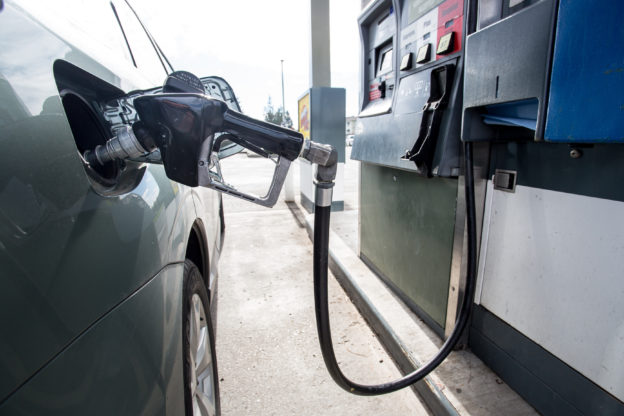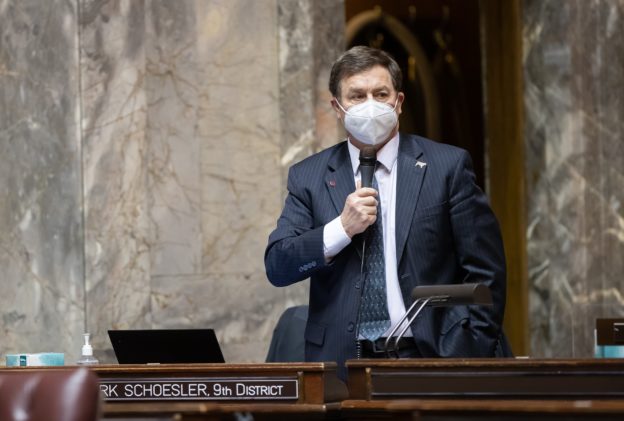Tag Archives: low-carbon fuel standard
Two environmental laws from the Democratic-controlled Legislature and Gov. Jay Inslee that took effect Jan. 1 are already causing fuel prices in Washington to rise, says state Sen. Mark Schoesler, R-Ritzville.
Schoesler, who represents eastern Washington’s 9th Legislative District, said he was notified by the Washington Independent Energy Distributors Association. that wholesale gasoline and diesel prices have risen in Washington as a result of the “cap-and-tax” law and the law creating a low-carbon fuel standard. Both laws were passed by the Legislature in 2021 but did not take effect until now.
Schoesler said wholesale fuel numbers he saw this week revealed gasoline prices had increased by 33.06 cents a gallon due to the “cap-and-tax” law and by 1.54 cents per gallon because of the low-carbon fuel standard. Meanwhile, the wholesale price of a gallon of diesel rose by 42.35 cents as a result of cap-and-tax and by 1.46 cents due to LCFS. Schoesler noted heating-fuel prices also have sharply increased in recent days, with more than two months of winter ahead.
“The wholesale fuel prices that I saw clearly show that ‘cap-and-tax’ and the low-carbon fuel standard are forcing fuel prices to increase at eastern Washington gas stations, and western Washington gas stations likely will see a similar hike. This contradicts claims by the governor and some of his allies that ‘cap-and-tax’ and LCFS will cause fuel prices to go up by only a few cents a gallon.
“Ever since these two laws were passed by the Democrats and signed by the governor, I’ve warned that they will force fuel prices to significantly increase. Now that these laws have gone into effect, we’re seeing that they indeed are causing hikes in fuel and heating-oil prices. This will hurt nearly everyone – commuters, parents taking their kids places, truckers and delivery drivers, and those working in agriculture. These increases will act like a gas-tax hike, but with no guaranteed benefits for our roads and highways.”
The Senate tonight narrowly passed a bill that would create a “high-cost fuel standard” in Washington.
House Bill 1091, approved 27-20, returns to the House of Representatives for concurrence, or agreement, with a Senate amendment to the proposal.
“This bill is the latest attempt by Governor Inslee to cram what he calls a ‘low-carbon’ fuel standard down Washingtonians’ throats,” said Schoesler, R-Ritzville. “There certainly is no guarantee this bill would improve the climate, but we can be guaranteed that fuel costs will skyrocket once this bill becomes law. Worse yet, it will act like a very expensive gas tax, but without any benefit to our roads.”
Schoesler said the Puget Sound Area Clean Air agency estimates costs of a similar localized LCFS program in 2019 would increase 57 cents per gallon for gasoline and rise 63 cents a gallon for diesel.
“Between the sharp increase in fuel prices caused by this bill and the ‘cap and tax’ bill that the Senate passed earlier tonight, it’s going to be a total shock for drivers when they fill up at the pump once these bills are implemented,” said Schoesler. “If you need to drive long distances for work or other reasons, this one-two punch courtesy of the Democrats is going to hit your wallet hard. This bill punishes people who can least afford it, and it will hurt agriculture in our state by imposing extra costs on farmers. This bill will put our economy at risk. People should think of Governor Inslee when they pay more at the pump because he’s the one who wanted it all along.”
The proposal would direct the Department of Ecology to adopt rules aimed at achieving a 20% reduction in greenhouse-gas emissions from fuel by 2035.
Under HB 1091, refiners would be required to blend gas and diesel with advanced biofuels to reduce the carbon content of fuel. Only a 2-4%reduction in emissions can be accomplished this way, and this is only a small part of the program. Most of the program (80-90 percent) is about creating a “credit market” managed by Ecology, requiring refiners to pay for government-approved carbon-reduction programs. Costs likely would be passed on to consumers. At least half the money would go to programs to promote electric cars.












